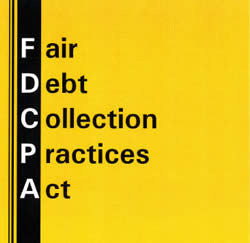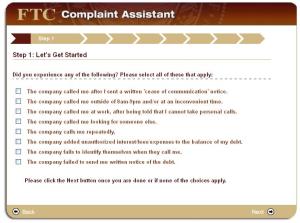
The Fair Debt Collection Practices Act (FDCPA), 15 U.S.C. §§ 1692-1692p was enacted to eliminate abusive debt collection practices by debt collectors, to insure that those debt collectors who refrain from using abusive debt collection practices are not competitively disadvantaged, and to promote consistent state action to protect consumers against debt collection abuses.
Even if you owe the money, debt collectors may not harass, oppress or abuse you or any third parties they contact.
Some examples of prohibited behavior include:
• use of threats of violence or harm
• publishing lists people who haven’t paid their debts
• using profanity or other obscene language
• repeatedly using the phone to annoy the debtor
• giving false credit information about a debtor to anyone, including a credit reporting agency
• sending a debtor anything that falsely appears to be or resembles an official notice from a court or government agency
• using a false company name
• demanding interest, surcharges, legal fees or collection fees that have not been agreed to, incurred or are not permitted under state or federal law
• depositing a post-dated check early
• taking or threatening to take property that cannot legally be taken
• contacting a debtor by postcard
• lying about anything
Some false statements that debt collectors often make when pursuing a debtor include:
• falsely claiming they are attorneys or they are with a government agency
• falsely claiming that the debtor has committed a crime or can be arrested
• falsely representing that they operate or work for a credit reporting company
• misrepresenting the amount the debtor owes, including adding surcharges, legal fees or collection fees
• claiming that papers they sent the debtor are legal forms when they are not
• claiming that papers they sent the debtor are not legal forms when they are
• threatening to take any action, such as seizure of property, that they cannot or do not intend to do
• threatening to garnish income that is not subject to garnishment
• threatening to sue a debtor for a debt that is not owed, or is too old to collect
A debt collector may contact you in person, by mail, e-mail, telephone, telegram or fax, but not with such frequency that it can be considered harassing. A debt collector may not contact you at work if they know your employer does not disapprove, nor may they contact you at unreasonable times, such as before 8 a.m. or after 9 p.m., or places, such as your workplace, school or social gatherings.
You can stop a debt collector from contacting you by writing a letter demanding that they stop. Once the agency receives it, they may cannot make any more contact except to acknowledge receipt of your demand and advise you that they will cease contacting you, or to notify you of a specific action contemplated by the creditor.
If you are being harassed by a debt collector, whether or not the debt is legitimate, you have rights. If the debt collector violates those rights, you may be entitled to actual damages caused by the harassment, plus up to $1,000 in statutory penalties. In addition, if you succeed against the debt collector in court as to the harassment issue, you can make the debt collector pay your attorney’s fees.
If a debt collector is hounding and harassing you and breaking the law, contact a lawyer. If you or the debt collector are in California and you want to talk to us, drop us a note here.
Walsh & Walsh, P.C., Orange County FDCPA debt collection attorneys.
By Mark A. Walsh





